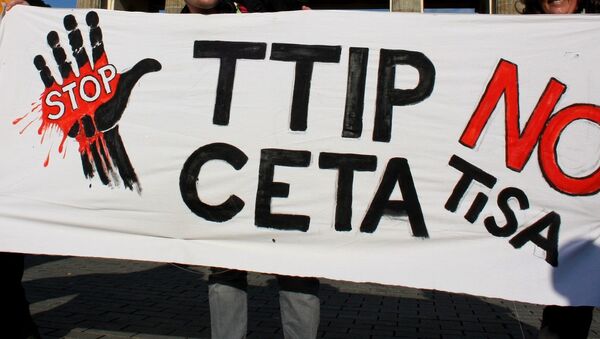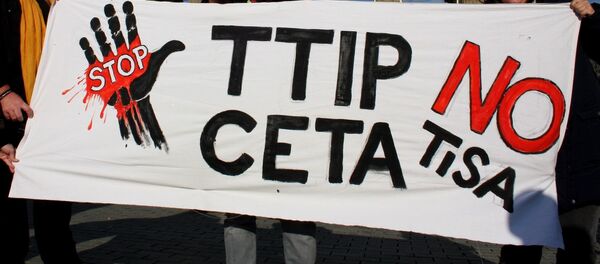MOSCOW (Sputnik), Daria Chernyshova — The Trade in Services Agreement (TISA) and Transatlantic Trade and Investment Partnership (TTIP) will erode democracy and foster deregulation, giving more rights to corporations, the director of the UK Global Justice Now democratic social justice organization told Sputnik.
"TISA – like TTIP – isn’t about the US vs the EU, it’s about people vs corporate power," Nick Dearden said Friday. "These trade agreements are attempts to erode democracy and build a sort of global constitution in favour of privatisation, deregulation and more rights for corporations. That’s why these things are being discussed in secret."
"Wikleaks have done us a huge favour this week, bringing to light discussions that our political leaders don’t believe we have a right to see, even though they will mean enormous changes in our society," Dearden said.
Dearden said the leaks proved that the campaigners were right to be worried and noted that the topic for discussion now was whether governments were able to regulate banks and the financial sector in a way that would have prevented the 2008 crash.
Moreover, Dearden noted that the discussed agreements would seriously threaten online privacy and neutrality, as well as pose threats to the environment through deregulation.
This week’s WikiLeaks release coincides with TISA meetings at the ministerial level at the Organization for Economic Co-operation and Development (OECD) in Paris.
The TISA deal has been under secret discussion since 2012, but the public first caught a glimpse of it in summer 2014. Back then, WikiLeaks took the wraps off an early draft annex on financial services that would assist the expansion of multinational corporations into global markets and facilitate cross-border exchange of personal and financial data.
A campaign officer at the European Federation of Public Service Unions (EPSU) told Sputnik that TISA authors want to impose the standards agreed by the European Union, the United States and other members of the North American Free Trade Agreement (NAFTA) on the rest of the world.
"There [is] a clear will by the ‘Real Friends of Services’ countries (the group that launched the TISA negotiations 4 years ago) to negotiate outside the WTO [World Trade Organization] and try to impose the standards agreed by the EU, US (NAFTA countries) and few others to the rest of the world," Pablo Sanchez told Sputnik.
"We do not believe that in these agreements any side will win, the designers of the agreement are a core of services multinationals to tap into the publicly funded services to get public money to run public services in the interest of the few," Sanchez said.
He explained that privatization did not prove to be efficient, while TPP, TTIP and TISA opened doors to private companies. The European Federation of Public Service Unions suggests bringing ownership to the local level to benefit people in Europe and across the globe "rather than making profit of such things as health, water, education, energy."
Critics of the deal have acknowledged that TISA is greater in scope than the 1994 North American Free Trade Agreement (NAFTA), but charge it will open the way to coordinated, supranational regulation labor laws, medical systems, finance and industrial policy.



